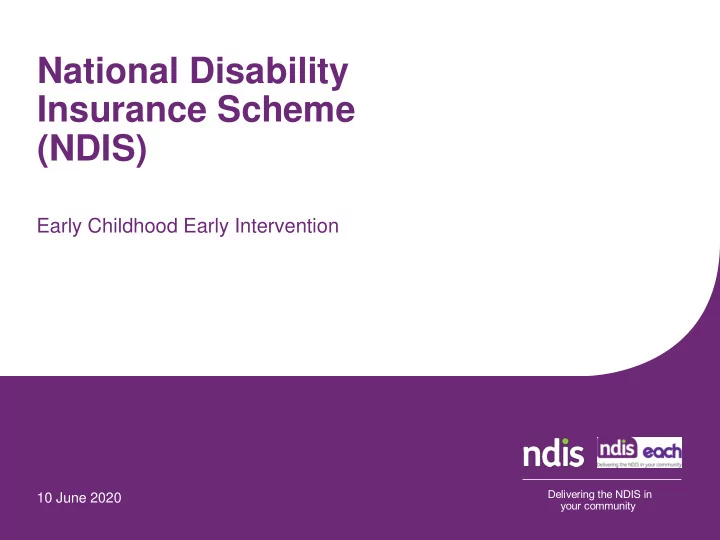

National Disability Insurance Scheme (NDIS) Early Childhood Early Intervention 10 June 2020
Brain Architecture of the Child’s Brain “ C a f s f a s a d a ” • Brain Architecture is built over time • Early years matter to shape the maturing architecture of the brain
Early Childhood Early Intervention Approach ( ECEI ) The NDIS ECEI approach will help all children ( 0 – 6 years) with a Developmental Delay or Disability and their families to achieve better long-term outcomes through support services in their local community, regardless of diagnosis.
Developmental Delay Developmental delay is defined by s.9 of the NDIS Act as a delay in the development of a child under 6 years of age that: a) is attributable to a mental or physical impairment or a combination of mental and physical impairments and b) results in substantial reduction in functional capacity in one or more of the following areas of major life activity: i. self-care; ii. receptive and expressive language; iii. cognitive development; iv. motor development; and c) results in the need for a combination and sequence of special interdisciplinary or generic care, treatment or other services that are of extended duration and are individually planned and coordinated
Early Childhood Early Intervention Approach ( ECEI ) The Early Childhood Early Intervention Approach recognises that children learn and develop best in their natural everyday settings, such as in the home, early childhood education services and play groups.
Early Childhood Early Intervention Approach ( ECEI ) The NDIS recognises that timely access to best-practice early childhood intervention is vital for children with developmental delay or disability to ensure that they achieve the best possible outcomes throughout their life course. Family centred practice that as its most fundamental purpose leaves a capacity and capability with the parent/primary carer to be the key positive influencer on the child. Evidence-based research, best practice approaches and the validated outcomes and evidence should be the informers of Early Childhood Early Intervention (ECEI) design and approach in the NDIS .
Why best practice is important?
Early Childhood Partners The NDIA has sourced experienced early childhood intervention professionals to work as partners to ensure the NDIS supports all children as early as possible. Early Childhood partners, will demonstrate strong clinical expertise and utilisation of early childhood best-practice approaches Each is the ECEI partner in Australian Capital Territory
Getting Supports & Services for your child
Services Continued
Who can refer to their local ECEI Partner Children can be referred to their local ECEI Partner in the Community by: • The family • Health and community health staff • Childcare Educators • Other Early Childhood services
Information and working out support needs of the child Early childhood partners will undertake a holistic approach of gathering information about the children with a developmental delay or disability and their families. They will use their knowledge of early childhood intervention to suggest appropriate supports to meet the individual goals and needs of each child and family. This may include: * Information and referrals e.g. information about mainstream supports such as local playgroups, referral to Community Health * Having conversations with families and other people in the child’s life about the functional impact of their difficulties/delay/disability.
Short term supports T Ea C d d Pa w a s pp d’s individual needs and circumstances. This may include: * Providing information & Strategies to families * Connecting the family and child with the most appropriate supports such as the community health centre, educational setting and playgroup * Providing some short-term early intervention where it has been identified as the most appropriate support
Longer Term Supports * Children with a diagnosed Disability that is lifelong and will have a s f a pa d’s f . * Children who do not have a diagnosed disability but there is significant delay in more than one areas of development which is likely to be ongoing for an extended period of time i.e ; children with developmental delay * Individualised NDIS funding * Implementation
Types of supports that NDIS may fund Early childhood Capacity Building intervention supports which may help with you and your family Communication - assisting the child to communicate & offering s a s & d as a d d’s d d a s d ds Self help and independence eg; dressing , toileting, mealtimes. Joining in – play and participation Emotional regulation Physical development Assistive technology eg. Wheelchairs, home modifications ramps
What NDIS won’t fund • s a d d’s disability • pp s that are the responsibility of other service systems such as health, early childhood education and Department of Education • Day to day living costs such as child care fees
Role of Health Diagnosis and Assessment • • Clinical services and treatment of health conditions – including all medical services such as general practitioners, care while admitted in hospital, surgery, • medications and pharmaceuticals. • Sub-acute care such as palliative care, rehabilitation geriatric and psychogeriatric care, post-acute care, including nursing care for treating health conditions and wound management • Community Health services such as speech therapy.
Contact your ECEI Partner: To contact EACH or make an ECEI referral call our Service Access Team on 1300 003 224
Questions? Comments?
For more information: Early childhood Early Intervention Approach https://www.ndis.gov.au/ecei.html All available on the NDIS website – www.ndis.gov.au A number of images in this presentation have been provided by Information Access Group
Recommend
More recommend